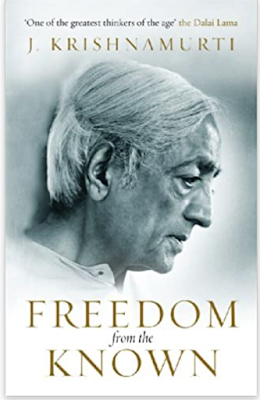When life gives you lemons one after another, you either make a batch of lemon pickle or devour books from the philosophy genre. Over the past 2 years, my hands by default navigate to the Philosophy section in my home library. The intent is not to pick up every learning from these books and put them into practice right away. Rather, I pick up these books to help me get answers to the questions that run in my mind. The feel of Aha moment is so real and priceless, when a book conveys exactly what I needed to hear.
Having read "What are you doing with your life?" by J. Krishnamurti (JK) a few months back, I wanted to continue diving into his writings further. This urge was also amplified by the book "Finding awareness", where it was evident that JK had a striking influence on the author Amit Pagedar and his thought process.
I picked up this book "Freedom from the Known" and while I was reading it, I realized that I shouldn't rush through. This books needs time and focus. Though it is a short book, the message is so deep and hard to grasp. I'm pretty sure I didn't understand all the passages, but I devoured it slowly, chapter by chapter.
This book is a compilation of passages from his talks on various topics. "Freedom from the known", as the title suggests, helps us identify those known aspects that bind us and keep us imprisoned for life. If we can observe our life as is without any judgments or analysis, we see a lot of our past conditioning, feeding our fears, desires, pleasures and pains.
Any form of outward change is triggered from within. In order to visualize and realize this, all we need is keen observation of our daily lives.
JK's typical style of writing comprises a lot of questioning and probing. His thoughts are not stated as mere facts or opinions. Rather, he engages in a dialogue that makes you want to stop and reflect.
A few months back, I had written a post on what it would be if there was a factory reset button for each of us. There was a powerful passage in this book, that resonated so deeply with that thought.
"You cannot live if you do not die psychologically every minute. To live completely, wholly, everyday as if it were a new loveliness, there must be dying to everything of yesterday, otherwise you live mechanically, and a mechanical mind can never know what love is or what freedom is."
The key take aways for me from this book are
- Observe, reflect and understand yourself as you are AND not focus on how you wish to be
- Be your own teacher and your own disciple when it comes to self awareness
- Keep your mind alert, clear and sensitive in order to observe yourself keenly
- Contradiction and conflict arises where there is a desire to change something/someone from "what is" to "what should be"
- Energy gets dissipated when there is any inward friction or outward conflict.
A few favorite passages from the book
"So long as you are compelled to do something because it is your duty, you don't love what you are doing. When there is love, there is no duty and no responsibility.""Measuring ourselves all the time against something or someone is one of the primary causes of conflict.""In all our relationships, each one of us builds an image about the other and these two images have a relationship, not the human beings themselves.""When you separate yourself by belief, by nationality or by tradition, it breeds violence""What are we afraid of is the repetition of the old - the thought of what has been projecting into the future. Therefore, thought is responsible for fear"













